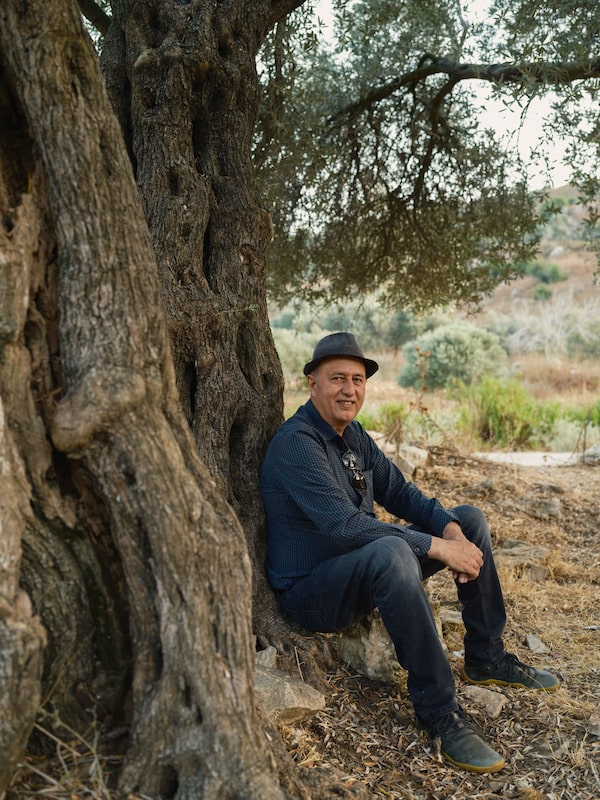
Dr. Nasser Abufarha, Founder of Canaan Palestine and the Palestinian Fair Trade Association.Supplied
For Palestinian-American Nasser Abufarha, the olive tree provides more than sustenance and income. It symbolizes his people’s identity, cultural traditions and resistance under Israeli occupation.
The antioxidant rich oil is a staple in Middle Eastern cuisine and beyond – whether drizzled over fresh tomatoes, whizzed into silky smooth hummus or used as an everyday cooking fat – and its production makes up the bulk of a robust olive industry in the Palestinian territories, worth more than US$150-million, according to the Palestine Trade Center.
“I love the celebration of the harvest,” said Abufarha, founder of Canaan Palestine, a certified organic and fair trade olive oil and specialty food brand. “I used to spend a couple of weeks with my grandma in the village, picking after professional pickers had finished the plot. It was a way for kids to make extra income. I’ve always known the potential of our farming; the challenge was always the market.”
Since 2004, Canaan Palestine’s network has grown to 2,500 regenerative family farms in 50 villages across the West Bank, pressing on average 1.5 million litres of extra-virgin olive oil each season, which it ships globally. The Globe and Mail spoke to Abufarha about the mystique of old-growth olive trees, farming under siege and turning a commodity into a community one olive oil shipment at a time.
How culturally important is olive oil to Palestinians?
Olive trees are a prominent feature of the land; they resemble our resilience and rootedness. Since a tree takes 15 years to cultivate returns, it links past, present and future generations. Palestine has about 100,000 families that live off olive tree production. We call wheat and olive oil “the two lions of the house.” For food security, it’s a very significant source.
An ancient olive tree, estimated to be 3000 years old, in the Jenin region, Palestine.KRIS HERBST Canaan Palestine/Supplied
I’ve experienced olive groves in Europe, but not 3,000-year-old trees. What’s it like to walk alongside ancient olive trees in the West Bank?
They’re so beautiful; the wrinkles in the trunk show her age. As the root system meets the soil, it expands outwards, almost hugging the land. The tree is so expressive of how much she loves home. We’ve changed cultural orientation many times in the holy land, but the tree continues to give across cultures. What kept this vegetation going is that the Canaanite relationship with fertility and regeneration hasn’t changed among the people.
Many family farms service trees in hilly, limestone-laden terrain across the West Bank where intensive farming isn’t possible. Does the lush native biodiversity add complexity to your oils?
There are beautiful olive oils coming from multiple regions around the world. A lot of the industry is totally invested in a fresh taste at the beginning, but there isn’t much after that. In our olive oil, there is this freshness, but then you will have a mouthful of different tastes. Rumi is a tangy, robust oil, so dip sourdough bread in it to start your meal. Nabali is fruity and more delicate. Jenin is made from a mix of early-, mid- and late-harvest. Early harvest has bitter notes, and late harvest has sweet, buttery tones. It’s your everyday olive oil for dipping, salads and cooking.
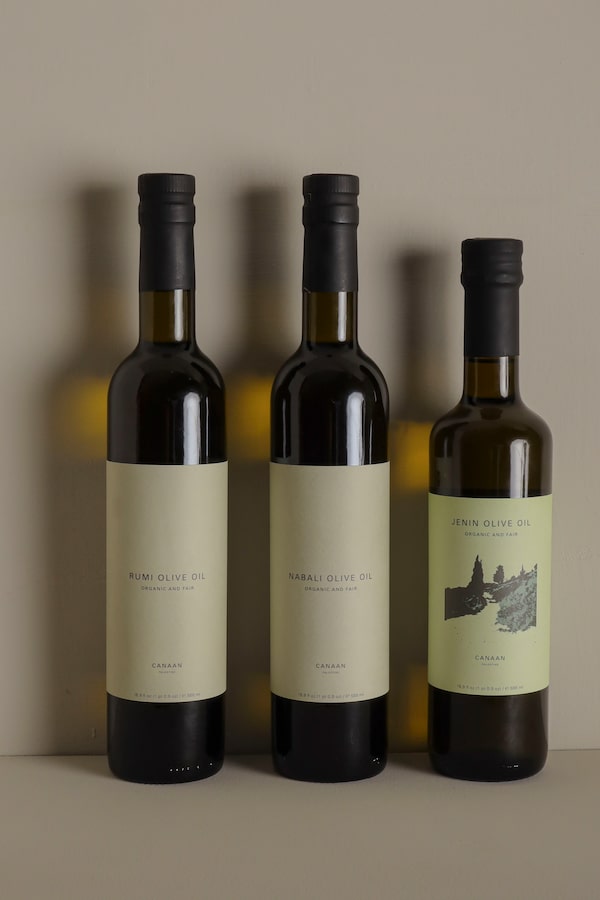
Canaan Palestine's organic and fair trade olive oil collection features Rumi, Nabali, and Jenin.Supplied
What inspired you to start Canaan Palestine?
We’ve been growing under occupation in the West Bank with limited access to markets outside of Palestine – and even within Palestine. The inspiration was the idea of fair trade: Canaan Palestine is a vehicle to establish food-to-market to help the farmers survive as family farms in the modern industrialized world. Olive oil is the only crop we have with a substantial surplus, so if we don’t export, the prices become very cheap, and it is not feasible for farmers to invest their energy in the maintenance of the land. I started selling in Canada and the United States in 2005 and discovered this was beyond just finding a route to market; this cultural heritage is as old as the ancient trees. The project celebrates this with the world and is conscious and active in protecting and nurturing it.
How has setting fair trade standards empowered farming communities?
It has changed the dynamic of the industry in Palestine. Before, traders would exploit the farmers by taking goods on credit or waiting until late January, when the farmers were in debt, to buy after they brought the prices down. We buy a significant amount of olive oil from the presses – and pay within two weeks. Since 2009, we made olive oil prices viable in the Palestinian market. Farmers are happy that people are paying a premium for their traditional ways.
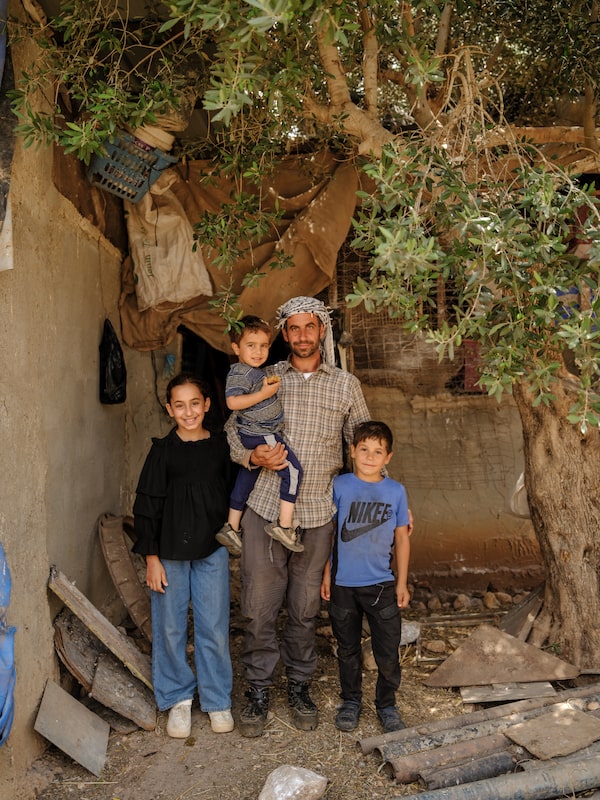
Olive farmer Abdeljabbar Al Qirim and family.Supplied
Every growing season has its challenges, but how did your farm partners still manage to pick last fall under unthinkable conditions?
It was a very difficult harvest. We fared fine at the end with a lot of hard work and risk-taking. People were killed by Israeli settlers along the way just for harvesting. We lost about one-third of the crop, which is significant for people under siege, but the beautiful thing is we managed to hold a harvest. The trees can go a year [without regular care], so I’m hopeful. We will get back to them when we can. I’m sure the farmers take every opportunity to harvest, as if they are stealing their olives from the army, and service the trees when they can. It’s unfortunate circumstances, but that’s what we deal with.
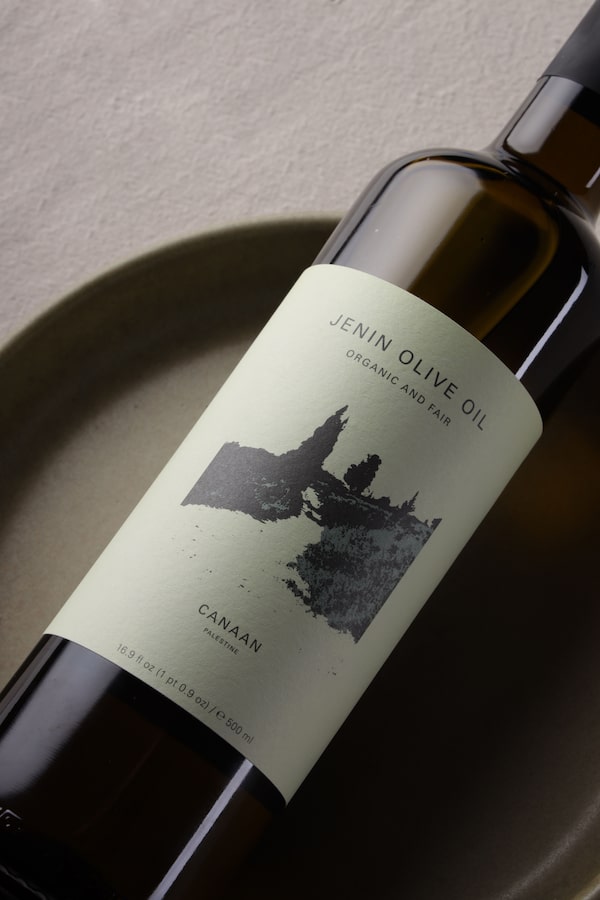
Jenin, Canaan Palestine's signature olive oil.Supplied
How has the support been?
We’ve seen a lot of young people, especially from the United States and Canada, expressing support for Palestine and our farmers, and that’s hopeful because we plant olive trees for the future. We are integrating into the world community that we’ve been apart from for so long.
What are your hopes for Canaan Palestine – and your homeland?
What we have is not only Palestinian; it’s a human legacy. A lot has radiated from this land, whether religion, cultural ideas or the development of the alphabet. To have this vibrant farming culture and wisdom still alive today is a treasure for our world. The only way to preserve this is to recognize Palestinians’ entitlement to live their culture in their landscape.
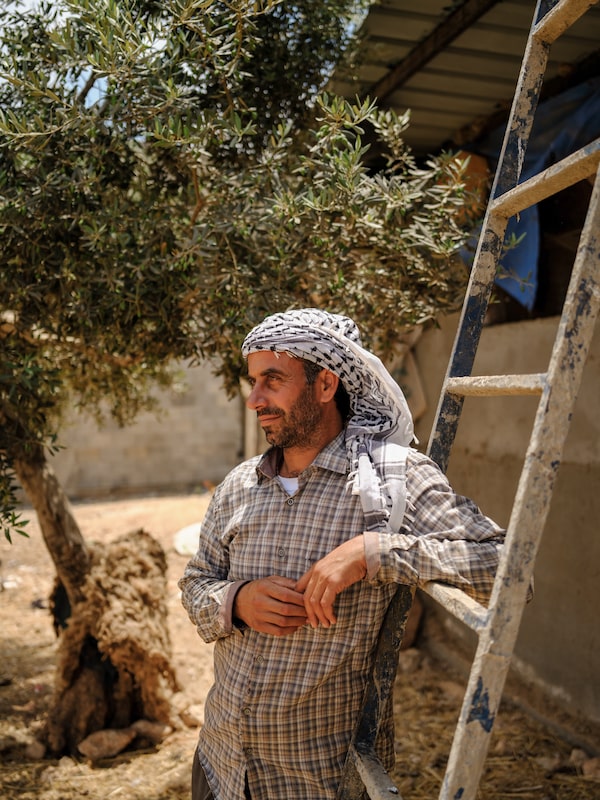
Olive farmer Abdeljabbar Al Qirim.Supplied
This interview has been edited and condensed.